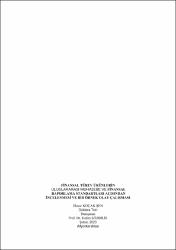| dc.contributor.advisor | Sözbilir, Halim | |
| dc.contributor.author | Koçak Şen, İlknur | |
| dc.date.accessioned | 2021-11-01T08:24:18Z | |
| dc.date.available | 2021-11-01T08:24:18Z | |
| dc.date.issued | 2020 | en_US |
| dc.date.submitted | 2020 | |
| dc.identifier.uri | https://hdl.handle.net/11630/9619 | |
| dc.description.abstract | Son yıllarda finansal piyasalarda önemli bir yer edinen türev ürünlerin işletmeler tarafından değişen piyasa koşullarına karşı korunmada ve uyum sağlamada kullanımlarının yaygınlaşmasıyla birlikte finansal tablolardaki miktarları da göreceli olarak artmıştır. Bu araçların bilgi kullanıcılarına tam ve doğru bir şekilde yansıtılabilmesi amacıyla, finansal tablo ve raporlarda nasıl muhasebeleştirileceği konusu da önemli bir sorun haline gelmiştir. Bu nedenle bu ürünlerin muhasebeleştirilmesi ile ilgili çeşitli düzenlemeler yapılmıştır.
Bu çalışmada, uluslararası alanda ve buna paralel olarak Türkiye’de yürürlükte olan Uluslararası Muhasebe ve Finansal Raporlama Standartları’nın, finansal türev ürünlerle ilgili kısımları incelenmiştir. Ayrıca hisse senetleri Borsa İstanbul’da işlem gören işletmelerin kamuya açıkladıkları finansal tablo dipnotları incelenerek, faaliyetlerinde hangi türev araç türlerini tercih ettikleri ortaya konmuştur. Kullanımı tercih edilen türev araç türleri dikkate alınarak da bu araçlarla işlem yapan bir imalat işletmesinin türev ürün işlemlerinin standartlar kapsamında nasıl muhasebeleştirileceği bir Vaka çalışması ile açıklanmıştır. | en_US |
| dc.description.abstract | In recent years, the amounts of derivative products, an important place in the financial markets, have increased in the financial statements by companies due to the widespread usage to protect and adapt to changing market conditions. In order to be able to accurately and properly reflect these tools to the information users, how to recognize them in financial statements and reports has become an important issue. Therefore, various arrangements have been made for the accounting of these products. In order to be able to accurately and properly reflect these tools to the users of information, how to recognize them in financial statements and reports has become an important issue. Therefore, various arrangements have been made for the accounting of these products.
In this study, the sections of derivatives of the International Accounting and Financial Reporting Standards in effect both in interntional area and correspondingly in Turkey were analysed. In addition, the footnotes of the financial statements disclosed to the public by the companies which shares are traded in Borsa İstanbul were examined and which types of derivatives preferred in their activities were revealed. A case study that how the derivative product transactions of a manufacturing company that is operating with these tools are accounted for under the standards by taking into consideration the preferred types of derivative instruments were explained. | en_US |
| dc.language.iso | tur | en_US |
| dc.publisher | Afyon Kocatepe Üniversitesi Sosyal Bilimler Enstitüsü | en_US |
| dc.rights | info:eu-repo/semantics/openAccess | en_US |
| dc.subject | Finansal Türev | en_US |
| dc.subject | Uluslararası Muhasebe | en_US |
| dc.subject | Finansal Raporlama Standartları | en_US |
| dc.subject | UMS 32 | en_US |
| dc.subject | UFRS 9 | en_US |
| dc.subject | UFRS 7 | en_US |
| dc.subject | UFRS 13 | en_US |
| dc.subject | UMS 21 | en_US |
| dc.title | Finansal türev ürünlerin uluslararası muhasebe ve finansal raporlama standartları açısından incelenmesi ve bir örnek olay çalışması | en_US |
| dc.title.alternative | An assesment of financial derivatives in terms of international accounting and financial reporting standards and a case study | en_US |
| dc.type | doctoralThesis | en_US |
| dc.department | Enstitüler, Sosyal Bilimler Enstitüsü, İşletme Ana Bilim Dalı | en_US |
| dc.relation.publicationcategory | Tez | en_US |
| dc.contributor.institutionauthor | Koçak Şen, İlknur | |



















